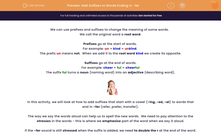We can use prefixes and suffixes to change the meaning of some words.
We call the original word a root word.
Prefixes go at the start of words.
For example: un + kind = unkind.
The prefix un means not. When we add it to the root word kind we create its opposite.
Suffixes go at the end of words.
For example: cheer + ful = cheerful
The suffix ful turns a noun (naming word) into an adjective (describing word).

In this activity, we will look at how to add suffixes that start with a vowel (-ing, -ed, -al) to words that end in -fer (refer, prefer, transfer).
The way we say the words aloud can help us to spell the new words. We need to pay attention to the stresses in the words - this is where we emphasise part of the word when we say it aloud.
If the -fer sound is still stressed when the suffix is added, we need to double the r at the end of the word.
For example: refer becomes referring.
Did you spot the new ending?
However, if the -fer sound is no longer stressed, the r is not doubled.
For example: refer becomes reference.
Did you spot the new ending?
Here are some examples of words that use these suffixes that we will practise in this activity:
referring
referred
referral
preferring
preferred
transferring
transferred
reference
referee
preference
transference
You can listen to them here - pay attention to where the stresses in the words are.
Use Look, Say, Cover, Write, Check to practise spellings a few times before we begin the activity.








